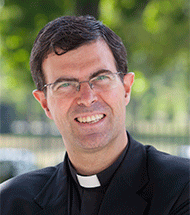Pablo Blanco Sarto, Professor of the School of Theology at the University of Navarra
A Christian Europe? Reflections on Europe Day

The fire of the Gothic cathedral of Notre-Dame is for many a symbol of today's Europe that has lost its Christian roots, a Europe in demolition. Will we be able to rebuild it, to build a Christian civilization, and to coexist with other religions? Christianity has been the predominant religion in Europe for centuries, and remains the majority religious membership in 27 of the 34 countries surveyed in the latest Pew Forum report . But historical divisions, also among Christians, underlie this common identity: only one of the three main Christian traditions (Catholicism, Protestantism and Orthodoxy) predominates in each part of the continent. While Orthodoxy is the dominant faith in Eastern Europe, Catholic-majority countries are common in the center and southeast of the continent, while Protestantism dominates in the misty lands of the north.
In addition, Western Europe has growing populations of unaffiliated religious citizens. Yes, there is an intense process of de-Christianization. But is Europe ceasing to be Christian, or is it simply changing the map as it moves to the peripheries? More than seven in 10 people in Romania, Greece and Serbia said that being Christian was important to their national identity, while 65 percent of people in France and the United Kingdom, 64 percent of Germans and 59 percent of Spaniards said that being Christian was not that important to them. The Baltic states of Estonia and Latvia are similarly different from the Eastern European states, with 82 percent and 84 percent of respondents from those countries respectively saying that religion was not important to their national identity.
Another fact. The majority of respondents from Central and Eastern European countries said they would not accept a Muslim into their family. Only 7 percent of Armenians or 16 percent in the Czech Republic said they would welcome a Muslim into their families. In contrast, nine in 10 respondents in the Netherlands, Denmark and Norway said they would accept him or her, and the majority of all other Western European countries said the same. Rejecting Islam, is this attitude too Christian, or too un-Christian? Is the problem - as the Lutheran Angela Merkel said - too much Islam or too little Christianity in Europe?
The survey also reflects a "significant decline" in Christian membership throughout Western Europe. There are several reasons why so many baptized as Christians no longer consider themselves as such. The main one is that they "gradually drifted away from religion." agreement At the same time, others point out that they do not agree with the Church's teachings on moral issues, even though they fully agree on social and ecological issues. In a part of the area where communist regimes repressed religions, with high ethical relativism, the Christian membership has shown a resurgence since the fall of the USSR in 1991.
Post-Christian lands are now more Christian. In Ukraine, for example, more people say they are now Christian (93%) than were previously (81%); the same is true in Russia, Belarus and Armenia. Central and Eastern Europeans are more likely than Western Europeans to say that religion is very important in their lives, to attend attend religious services monthly and to pray daily. What will the map of religion in Europe look like in the coming years? What will the Christianity of the future look like on our old continent? Everything will depend on whether Europe reaches the Urals or not.
